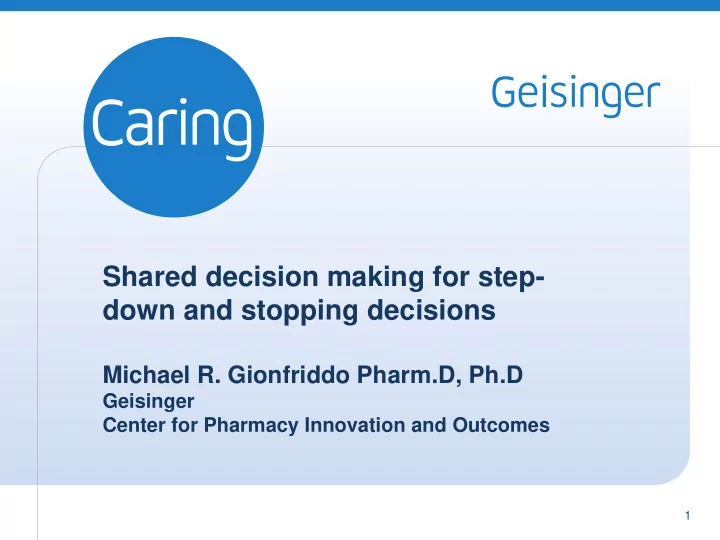

Shared decision making for step- down and stopping decisions Michael R. Gionfriddo Pharm.D, Ph.D Geisinger Center for Pharmacy Innovation and Outcomes 1
Disclosures • I have had travel and lodging paid for by PhRMA to speak on medication adherence • I consult with Pfizer on Shared Decision Making in the areas of Rheumatoid Arthritis and Inflammatory Bowel Disease and have received compensation for this work as well as having travel and lodging paid for to attend meeting related to this work. • I act as a co-investigator on a grant funded by AstraZeneca on improving prescribing of guideline recommended therapies post-acute coronary syndrome 2
Opening: Why are you here? 3
Objectives At the completion of the workshop the attendee will: • Identify situations where step-down may be appropriate • Describe barriers patients and clinicians face to step-down • Demonstrate the use of tools to facilitate step-down conversations 4
What is Shared Decision Making? 5
What is Shared Decision Making? A process by which clinicians and patients think, talk, and feel through a troubling situation and come to a resolution about how to manage that situation in a way that considers the medical evidence in light of the patient’s situation and values. Uncertainty • Evidence • Values • Implementation 6
7
Case You are an 80 year old individual who is seeing their primary care clinician for a routine visit. You heard from a neighbor at the retirement village that their clinician recently stopped their cholesterol medication. You ask your clinician if you could stop your cholesterol medication. 8
Statin Choice decision aid 9
Step-down • Step-down • Stopping • Reduction • Discontinuation • Withdrawal • De-escalation 10
Why De-escalation? 11
Why De-escalation? • Inappropriate • Non-adherence • Change in benefit/risk ratio • Adverse effects • Age • Health Status • New evidence 12
Barriers to De-escalation? 13
Barriers to De-escalation? • Clinician • Patient • System 14
Barriers to De-escalation? • Clinician • Awareness • Inertia • Self-efficacy • Feasibility Anderson et al. BMJ Open 2014 15
Barriers to De-escalation? • Patient • Fear • Appropriateness • Lack of clinician support • Peer or clinician pressure to remain on medication Reeve et al. Drugs and Aging 2013 16
Barriers to De-escalation? • System • Incentives 17
Signals for De-prescribing? 18
Signals for De-prescribing • Polypharmacy • Non-adherence • Multiple prescribers • Complex or Frail patient • High-risk drugs • Suspected Prescribing Cascade • Recent Hospitalization/Transitions of Care • Life limiting diagnosis • Palliative Care 19
Tools to facilitate de-escalation • Lists • Beers • STOPP • IPET • Etc. • Algorithms • Deprescribing.org • Proton Pump Inhibitors • Benzodiazepines • Anti-hyperglycemics • Protocols • Scott et al. • Jansen et al. 20
The Deprescribing Protocol 1. Ascertain all drugs the patient is currently taking and the reasons for each one 2. Consider overall risk of drug-induced harm 3. Assess each drug for its eligibility to be discontinued 4. Prioritize drugs for discontinuation 5. Implement and monitor drug discontinuation regimen Scott et al. JAMA IM 2015 21
Scott et al. JAMA IM 2015 22
• “Since you started this medicine, has it made such a difference to how you feel that you would prefer to stay on it?” • “Are you still experiencing any troublesome symptoms? Do you feel the medicine is still required?” • “Apart from side effects, are their any other concerns you have with your medicine?” • Quantity vs. Quality of life Scott et al. JAMA IM 2015 23
Deprescribing Process (SDM) 24 Jansen et al. BMJ 2016
General tips • Taper if necessary • One at a time • Support and communicate with the patient • Monitor for adverse effects or return of symptoms • Consider less harmful alternatives • Behavioral therapies 25
Case You are an 50 year old individual who recently moved and is seeing their primary care clinician for a new patient visit. During the visit, the clinician reviews your medication list and asks you about your medication for acid reflux. 26
27
28
29
30
Questions? Michael R. Gionfriddo Pharm.D, Ph.D Geisinger Center for Pharmacy Innovation and Outcomes Forty Fort, PA 18708 mgionfriddo@Geisinger.edu 31
Recommend
More recommend